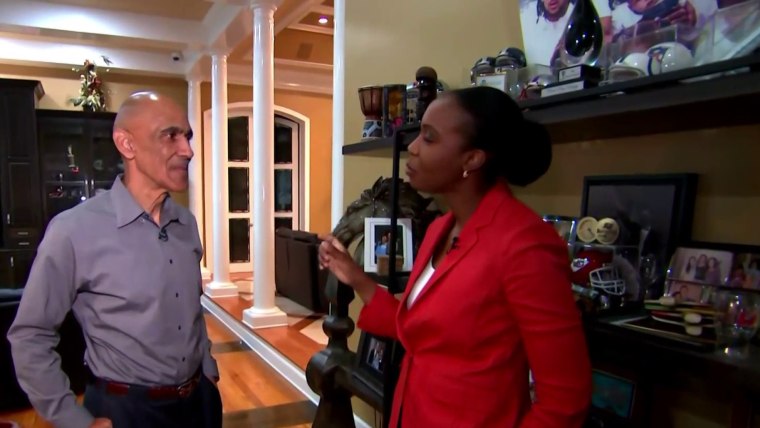It’s the NFL’s Black Monday, the unfortunate moniker for the day after the end of the regular season that kicks off teams’ ritual firing of unsuccessful coaches.
But Black Monday started a day early this year. The New England Patriots pink-slipped head coach Jerod Mayo before Fox’s NFL broadcast crew wrapped Sunday afternoon’s early slate of games, a sign the Patriots were only waiting for players on their 4-13 squad to hit the showers before they delivered the news. Rob Gronkowski, a former Patriots star-turned-TV analyst, was apoplectic.
The New England Patriots pink-slipped head coach Jerod Mayo before Fox’s NFL broadcast crew wrapped Sunday afternoon’s early slate of games.
“I mean, he never had the chance to develop as a head coach. He was just a rookie himself in that department, and if you judge a coach in their first year, that’s really not appropriate,” Gronkowski said, turning to former Dallas Cowboys head coach Jimmy Johnson and pointing out that Johnson won only one game in his first year but ultimately won two Super Bowls during his five years with the team.
Gronk was onto something — even if unintentionally. Johnson is white. Mayo is Black. And while there are other differences in their situations — coaching in different decades and for owners with dramatically different approaches to running their teams — race can’t be overlooked. The NFL has a history of giving lopsided opportunities to white, male coaches. The short leash the Pats gave Mayo shows how far the league is from fulfilling its promises to do better at creating racial equity in its coaching corps.
In 2003, the NFL established the “Rooney Rule,” which required teams to interview at least one nonwhite candidate for every available head coaching job. The rule was implemented because up-and-coming Black coaches were being glaringly ignored as their white counterparts were hired and some white head coaches with terrible win-loss records were being given multiple bites at the apple. The rule has been expanded to require teams to interview at least two women or racial minorities for head coaching opportunities.
Even so, in 2004, there were three Black head coaches among the NFL’s 32 teams and this season there were six; the league had a total of nine nonwhite coaches to start the season. In a league in which 53.5% of the players are Black, there have never been more than seven Black coaches, or 22% of the total, in any given season, according to data compiled by The Athletic.
Mayo’s termination is a reminder of how rarely Black head coaches get fair shots at turning their teams around, assuming fairness is defined at least in part by getting more than a single season to make progress. Most coaching jobs open up when someone gets fired for losing too much, which adds enormous pressure and expectations for the next coach.
These jobs come with seven-figure salaries (Mayo’s deal was worth a reported $3.5 million per year from the Patriots) but also come with the weight of rebuilding rosters, reconstructing coaching staffs and installing new offensive and defensive systems aimed at improving bottom-feeders. Unless coaches catch lighting in the form of generational draft picks or dramatic improvement in retread players, turnarounds can take years.
Mayo’s termination is a reminder of how rarely Black head coaches get fair shots at turning their teams around.
And while some white coaches have been fired after single losing seasons, the situation is worse for Black coaches in part because so few of them get coaching opportunities in the first place.
Of the 19 Black head coaches who have been hired in the NFL since Art Shell became the first to lead an NFL team in the modern era in 1989, six, including Mayo, have had one-and-done seasons. Romeo Crennel was twice fired after a single season.
Mike Tomlin, the longest-tenured Black head coach in league history, works for the Pittsburgh Steelers, the team whose ownership group, the Rooney family, is the namesake of the NFL’s rule about coaching interviews. In his 18 years at the helm, he has never had a losing season. His team heads to the playoffs next Saturday and is a heavy underdog to the Baltimore Ravens.
Tomlin’s long streak of success highlights the angst that the late Georgetown University basketball coach John Thompson Jr. felt about the hurdles Black coaches face. Thompson famously fumed that other Black coaches were held to near impossible standards just to be considered qualified for opportunities that routinely went to unaccomplished white coaches.
“There are a whole lot of white coaches who aren’t successful,” Thompson once said. “Blacks don’t have to win the National Championship to get an opportunity to coach. ... All we want is an opportunity to get out there to try — and a right to fail also. I'm sick of us having to be perfect to get the job.”
For his part, Patriots owner Robert Kraft said Monday that he felt bad firing Mayo, saying he had put the coach “in an untenable situation,” an apparent reference to the subpar roster Mayo inherited after the Patriots parted ways with Bill Belichick last season. Nonetheless, Kraft opted not to give his head coach a chance to fail in his first go-round as an NFL head coach before he was fired.
Mayo deserved better, and he deserves another chance.
